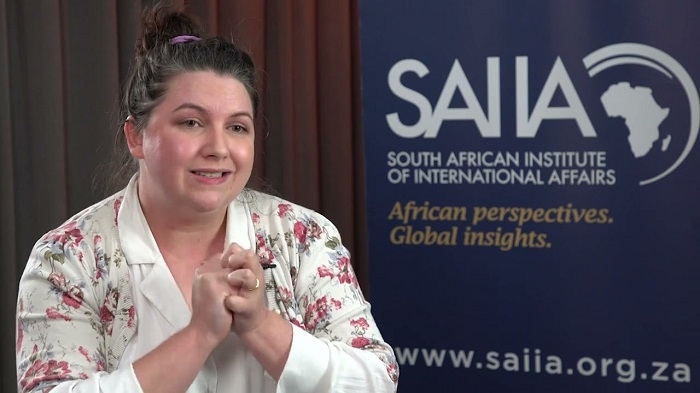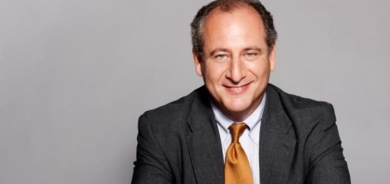Ms. Arina Muresan to Gulan: People are easily radicalized when they feel they have no options or future

Ms. Arina Muresan is a Senior Researcher and Project Manager, she leads on the IGD’s flagship project “South Africa in the World”. Her research interests include foreign policy, perception studies linked to public diplomacy and nation branding, as well as geopolitical risk analysis with a focus on Africa, the BRICS and other emerging markets. In research and advocacy support she also continues to engage civil society and labor networks in the internationalization of agendas and interests of South Africans. Her recent publications include: (2023) ‘BRICS immigration policies and visa regimes, strategic cooperation for a future BRICS African agenda’,’Polylateralism and diplomacy in Africa’s International Partnerships’, ‘Economic Diplomacy and the African Continental Free Trade Agreement: Challenges and Prospects’, (2022) ‘South African engagement in club governance: A boon for economic diplomacy’, (2021) ‘Seeking African Agency in Global Clubs’, ‘Chinese and South African Labour Relations: An Analysis’, ‘Shaping the Future of Multilateralism: Could SA spurred on by Covid-19, drive more equitable global trade norms?’, (2020) ‘Overcoming bureaucratic and institutional challenges in South African foreign policy making’, (2019) ‘ South Africa’s image in Africa and its impact on its Africa-BRICS relationships’, (2018) ‘African First Ladies, Politics and the State’
Gulan: If African countries are called southern countries, then these countries have not benefited from the so-called "new world order or international liberal system", the question is why the international liberal system is not in favor of the southern states?
Ms. Arina Muresan: The liberal system was constructed during a particular period in world history. When the famous meeting took place at Bretton Woods in 1944, creating conditions for the IMF and World Bank to stabilize the world order, there were only 44 countries that attended. African countries only started gaining their independence from 1956 and so the system in place was already hedged towards countries that were allowed to participate independently in the international order and had benefitted substantially from a colonial system too. A set of rules were already set, and unfortunately it is hard to change those rules if it means that it reduces the conditions of those already benefitting from an international system
Gulan: How is Africa impacted by the war in Ukraine, and why did African leaders recently promote their own peace plan to end the war?
Ms. Arina Muresan: We’ve seen African countries that have been hit hard through trade value chains and currency. The African peace initiative was an important political initiative that attempted to show the impact the war has on African countries. Although African countries are not majority consumers of Ukrainian grain, food prices have sky rocketed, inflation has been difficult to manage, and in general the exchange rate against the dollar have put African countries in increasingly difficult economic conditions. Most importantly, African countries called for dialogue.
Gulan: The Middle East and Africa is an unstable zone and has become a source of terrorist organizations, which is a great threat to world peace and security, what are the root causes for the emergence of these groups in some African and Middle Eastern countries?
Ms. Arina Muresan: We cannot discount that without development, there can be no peace. People are easily radicalized when they feel they have no options or future. This does not diminish the fact that terrorist organizations attack indiscriminately to make a statement and it is hypocritical to state that these actions are for a greater good.
Gulan: Right now, two major African countries- Niger and Sudan- are embroiled in a profound turmoil and troubles, how do see these dramatic developments in these countries?
Ms. Arina Muresan: Both of these countries have complex causes for political instability. However, a major cause for concern for both is mounting food security risks, this is what Africans need to have compassion for.
Gulan: To be fair, there are sparkling success stories in African Continent, like Botswana, to what extent can these success experiments be a source of aspiration for another struggling nations in this Continent?
Ms. Arina Muresan: By comparison, Botswana has a much smaller population than other African countries. Its history also creates different conditions that are carried to the present day. With fewer challenges that come along with a large population that does not have access to education and other social security nets, your governance challenges are not as complicated. Government just needs to be prudent and long-term visions are easier to implement. There are a few key industries that have been managed to a very high quality and found markets abroad (tourism, cattle farming and diamond mining come to mind). However, this doesn’t mean that a poverty gap does not exist, or that civil society does not feel represented by the political party. I don’t believe Botswana’s example can be replicated in the present day.
Gulan: What do you make about the recent BRICS attempt to decrease dependency on the US currency?
Ms. Arina Muresan: This creates optimistic conditions where countries are heavily dependent on the USD. Regrettably, the US has had immense privilege where it dominates the world but it also takes a heavy-handed approach to pursuing its interests. The USD has been used as a punitive tool implementing unilateral sanctions, and in cases where countries have grown too fast have been obstructed or attempted to be contained by the US. It a USD backlash was inevitable. While de-dollarisation doesn’t happen overnight, the BRICS have been working towards alternative payment systems for over a decade now, and the function of BRICS is to further learn about policy cooperation.
Gulan: So, can the BRICS actually contribute in transforming the global political and economic system to it is favor?
Ms. Arina Muresan: The BRICS, while they are pragmatic, they want to make more options available. The BRICS are able to have conversations in parts of the world where the West cannot. Look at China’s engagement of Saudi Arabia and Iran. The Middle East is the most complicated region and the BRICS showed their vision for the future can look to stronger economic drivers.















